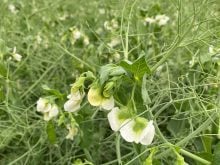Prairie farmers could reap great rewards if the amount of identity preserved grain production is increased, says farm management consultant Gary Pike.
“I think this is a huge opportunity for agriculture in Western Canada,” said Pike, head of Pike Management Ltd. in Lethbridge, Alta., and one of the speakers at a grain industry conference in Winnipeg.
“We’re just at the beginning of something much larger.”
Much of the discussion at the Fields on Wheels conference, organized by the Transport Institute at the University of Manitoba, focused on how to develop IP systems that would bring more profits for all links in the supply chain, including farmers.
Read Also

Crop quality looks good this year across Prairies
Crop quality looks real good this year, with the exception of durum.
Pike said his company works with farmers who are involved with many small IP systems already. They grow specialized seed, specialty canola, or other small acreage crops.
He thinks these programs bring them a $40 to $60 per acre premium on regular production.
Pike said only a small percentage of producers grow IP crops, and those that do only have 10 to 20 percent of their production in IP crops.
However, there is potential for growth in both the number of crops and producers, he added.
Raymond Lottie, who is in charge of General Mills’ cereal grain collection system, said IP systems can be cheap or expensive, depending on how stringent the standards are.
If an IP system is introduced to handle genetically modified grain, designers need to make sure there is still extra value to the supply chain after all the extra costs are subtracted. A system that attempted to guarantee 100 percent GM-free crops could be prohibitively expensive.
“If it’s an absolute zero tolerance system, it would considerably raise the cost of our ingredient handling and the cost of our products,” said Lottie, whose company is one of the main users of Canadian oats.
Not only do IP systems increase handling costs on segregated grain itself, they also add costs to the rest of the handling system because of lost flexibility, Lottie said.
Pike said Canadian farmers would embrace IP crops if they were worth their while financially.
“If you can show me a Roundup Ready wheat that has (special food) attributes that are well above any of the other wheats I can grow and there’s a reward at the end … then we will move very quickly towards accepting it and it will cover off the additional cost of keeping it separate,” said Pike.
Monsanto, which makes Roundup, is the first company expected to try to register GM wheat varieties.
Monsanto GM wheat manager Curtis Rempel said farmers must share in the financial benefits to make an IP system work.
“The farmer has to make money,” he said.

















